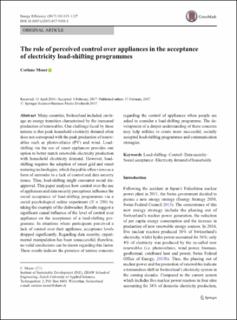Please use this identifier to cite or link to this item:
https://doi.org/10.21256/zhaw-1569Full metadata record
| DC Field | Value | Language |
|---|---|---|
| dc.contributor.author | Moser, Corinne | - |
| dc.date.accessioned | 2018-01-18T11:18:52Z | - |
| dc.date.available | 2018-01-18T11:18:52Z | - |
| dc.date.issued | 2017 | - |
| dc.identifier.issn | 1570-646X | de_CH |
| dc.identifier.issn | 1570-6478 | de_CH |
| dc.identifier.uri | https://digitalcollection.zhaw.ch/handle/11475/2133 | - |
| dc.description.abstract | Many countries, Switzerland included, envisage an energy transition characterised by the increased production of renewables. One challenge faced by these nations is that peak household electricity demand often does not correspond with the peak production of renewables such as photovoltaics (PV) and wind. Load-shifting via the use of smart appliances provides one option to better match renewable electricity production with household electricity demand. However, load-shifting requires the adoption of smart grid and smart metering technologies, which the public often views as a form of surrender to a lack of control and data security issues. Thus, load-shifting might encounter social disapproval. This paper analyses how control over the use of appliances and data security perceptions influence the social acceptance of load-shifting programmes via a social psychological online experiment (N = 250) by taking the example of the dishwasher. Results suggest a significant causal influence of the level of control over appliance on the acceptance of a load-shifting programme. In situations where participants perceived a lack of control over their appliance, acceptance levels dropped significantly. Regarding data security, experimental manipulation has been unsuccessful; therefore, no valid conclusions can be drawn regarding this factor. These results indicate the presence of serious concerns regarding the control of appliances when people are asked to consider a load-shifting programme. The development of a deeper understanding of these concerns may help utilities to create more successful, socially accepted load-shifting programmes and communication strategies. | de_CH |
| dc.language.iso | en | de_CH |
| dc.publisher | Springer | de_CH |
| dc.relation.ispartof | Energy Efficiency | de_CH |
| dc.rights | Licence according to publishing contract | de_CH |
| dc.subject.ddc | 333.79: Energie | de_CH |
| dc.title | The role of perceived control over appliances in the acceptance of electricity load-shifting programmes | de_CH |
| dc.type | Beitrag in wissenschaftlicher Zeitschrift | de_CH |
| dcterms.type | Text | de_CH |
| zhaw.departement | School of Engineering | de_CH |
| dc.identifier.doi | 10.21256/zhaw-1569 | - |
| dc.identifier.doi | 10.1007/s12053-017-9508-5 | de_CH |
| zhaw.funding.eu | No | de_CH |
| zhaw.issue | 5 | de_CH |
| zhaw.originated.zhaw | Yes | de_CH |
| zhaw.pages.end | 1127 | de_CH |
| zhaw.pages.start | 1115 | de_CH |
| zhaw.publication.status | publishedVersion | de_CH |
| zhaw.volume | 10 | de_CH |
| zhaw.embargo.end | 2023-01-01 | de_CH |
| zhaw.publication.review | Peer review (Publikation) | de_CH |
| Appears in collections: | Publikationen School of Engineering | |
Files in This Item:
| File | Description | Size | Format | |
|---|---|---|---|---|
| 2017_Moser_The role of perceived control over appliances_Energy Efficiency.pdf | 522.77 kB | Adobe PDF |  View/Open |
Show simple item record
Moser, C. (2017). The role of perceived control over appliances in the acceptance of electricity load-shifting programmes. Energy Efficiency, 10(5), 1115–1127. https://doi.org/10.21256/zhaw-1569
Moser, C. (2017) ‘The role of perceived control over appliances in the acceptance of electricity load-shifting programmes’, Energy Efficiency, 10(5), pp. 1115–1127. Available at: https://doi.org/10.21256/zhaw-1569.
C. Moser, “The role of perceived control over appliances in the acceptance of electricity load-shifting programmes,” Energy Efficiency, vol. 10, no. 5, pp. 1115–1127, 2017, doi: 10.21256/zhaw-1569.
MOSER, Corinne, 2017. The role of perceived control over appliances in the acceptance of electricity load-shifting programmes. Energy Efficiency. 2017. Bd. 10, Nr. 5, S. 1115–1127. DOI 10.21256/zhaw-1569
Moser, Corinne. 2017. “The Role of Perceived Control over Appliances in the Acceptance of Electricity Load-Shifting Programmes.” Energy Efficiency 10 (5): 1115–27. https://doi.org/10.21256/zhaw-1569.
Moser, Corinne. “The Role of Perceived Control over Appliances in the Acceptance of Electricity Load-Shifting Programmes.” Energy Efficiency, vol. 10, no. 5, 2017, pp. 1115–27, https://doi.org/10.21256/zhaw-1569.
Items in DSpace are protected by copyright, with all rights reserved, unless otherwise indicated.